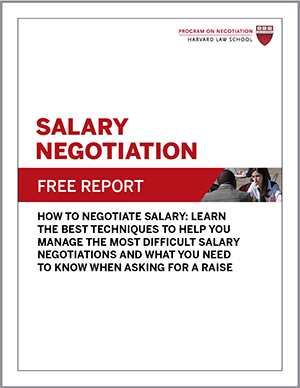
The last time you got a job offer, did you try to negotiate to improve it? If you’re like most people, you might not have tried to negotiate a job offer. In a 2023 Pew Research Center survey, for example, about 60% of U.S. workers said they did not to try to negotiate for higher pay when offered a job.
That’s unfortunate, because when you successfully negotiate for higher pay, you not only earn more right away but also dramatically boost your lifetime earnings. In their book Ask for It, Linda Babcock and Sara Laschever illustrate this with the example of two recent MBA graduates who are each offered a $100,000 salary. One person accepts the offer as is, while the other negotiates for more and ends up at $115,000 per year. Undoubtedly, an extra $15,000 annually is really nice. But over the course of their careers, if both employees received 3% annual raises, and the person who negotiated invested their extra income in an account earning 3%, the negotiator would end up with over $1.5 million more in lifetime earnings than the non-negotiator.
That’s a staggering bonus for negotiating that first job—and it doesn’t even include the many other issues one could negotiate, such as flextime, travel, remote work, and responsibilities. Negotiating a job that is better suited to your needs than the one on the table will likely improve your job satisfaction and performance, to the benefit of the hiring organization.
So, why are so many people reluctant to negotiate a job offer? Because they are afraid they will lose the offer entirely if they negotiate, researchers Einav Hart, Julia B. Bear, and Zhiying (Bella) Ren found in a 2024 study published in Organizational Behavior and Human Decision Processes.
A Misplaced Fear
Job candidates have an exaggerated fear that negotiating for more—more money, benefits, perks, and other issues—will jeopardize the offer on the table, Hart and her colleagues found.
In one experiment, the team surveyed nearly 1,500 employers with management and hiring experience about job offers they’d made in the past. Overall, the respondents said they had withdrawn only about 6% of the offers they had made over the course of their careers. When they did, it was often because a job candidate behaved inappropriately or rudely. That is, revoking an offer seems to be an uncommon phenomenon—and when it happens, it’s not typically because the candidate asked for more.
Yet across this and other experiments, job candidates viewed offer revocation as a significant risk of negotiating. In fact, they viewed it as 33% more likely to happen than managers did.
Faulty Thinking
Why do candidates overestimate the risk of losing a job offer? First, the researchers found, candidates tend to take a more competitive, zero-sum approach to job negotiations than managers do. “Candidates think that any gains on their end would come at the manager’s expense, and that any deal that would be good for the organization would be bad for them,” Hart, Bear, and Ren write in the Harvard Business Review.
This type of zero-sum thinking is common when we are being evaluated, past research has shown. It’s also more likely when the personal stakes of a negotiation are high, one study found, as they are in job negotiations. In addition, job candidates tend to lack information about the organization that could lead them to view the negotiation as more collaborative. By contrast, managers “are more likely than candidates to have a broader, more flexible view of the hiring situation, encompassing organizational goals along with their own hiring needs,” write Hart, Bear, and Ren.
In addition, the researchers write, “the more one expects that a negotiation attempt will lead to adverse consequences—particularly, increasing the likelihood of jeopardizing a deal—the more likely one is to avoid negotiating.” Job candidates’ awareness that they likely have less power in the negotiation than the hiring manager may also make them pessimistic about their ability to successfully negotiate a job offer.
How to Counter a Job Offer
The experimental results should come as good news to job candidates and shrug off such pessimistic thinking: The odds that a hiring manager will be so offended by your negotiation attempt that they revoke an offer seems to be quite low. In most situations, you should feel comfortable expressing appreciation for an offer and—before acceptance—asking for some improvements.
When trying to negotiate a job offer, don’t limit yourself to just asking for more money. Job candidates often fixate on how to negotiate a higher salary when negotiating a broader range of issues would get them more of what they want and set them up for on-the-job success.
“Reframe a zero-sum mindset by identifying potential win-win solutions in the negotiation,” recommend Hart, Bear, and Ren. “For example, maybe you care more about working remotely than about the small signing bonus. Your boss might really appreciate the savings and be flexible about where you work.” Such proposed trade-offs should be well received when you take the time to think about not only what you want but also what the organization likely values.
If you are a hiring manager, how do you feel about candidates’ attempts to negotiate a job offer?





How I feel about attempts to negotiate a job offer depends on a few factors:
1) Why is the candidate changing jobs? Are they running from something, or running to something? What is their “Why” (credit: Simon Sinek).
2) What is the candidates work history? If they change jobs frequently, I suspect they may be opportunistic and dig deep into their reasons for leaving.
3) If we believe our offer is fair, we tend to stick to it, but make it clear, “If you perform and contribute the way we think you can, you will be taken care of through our variable compensation (bonus) plans.”
4) If it is possible to connect achieving a specific goal to granting their request in their first year of employment with us, we sometimes will.